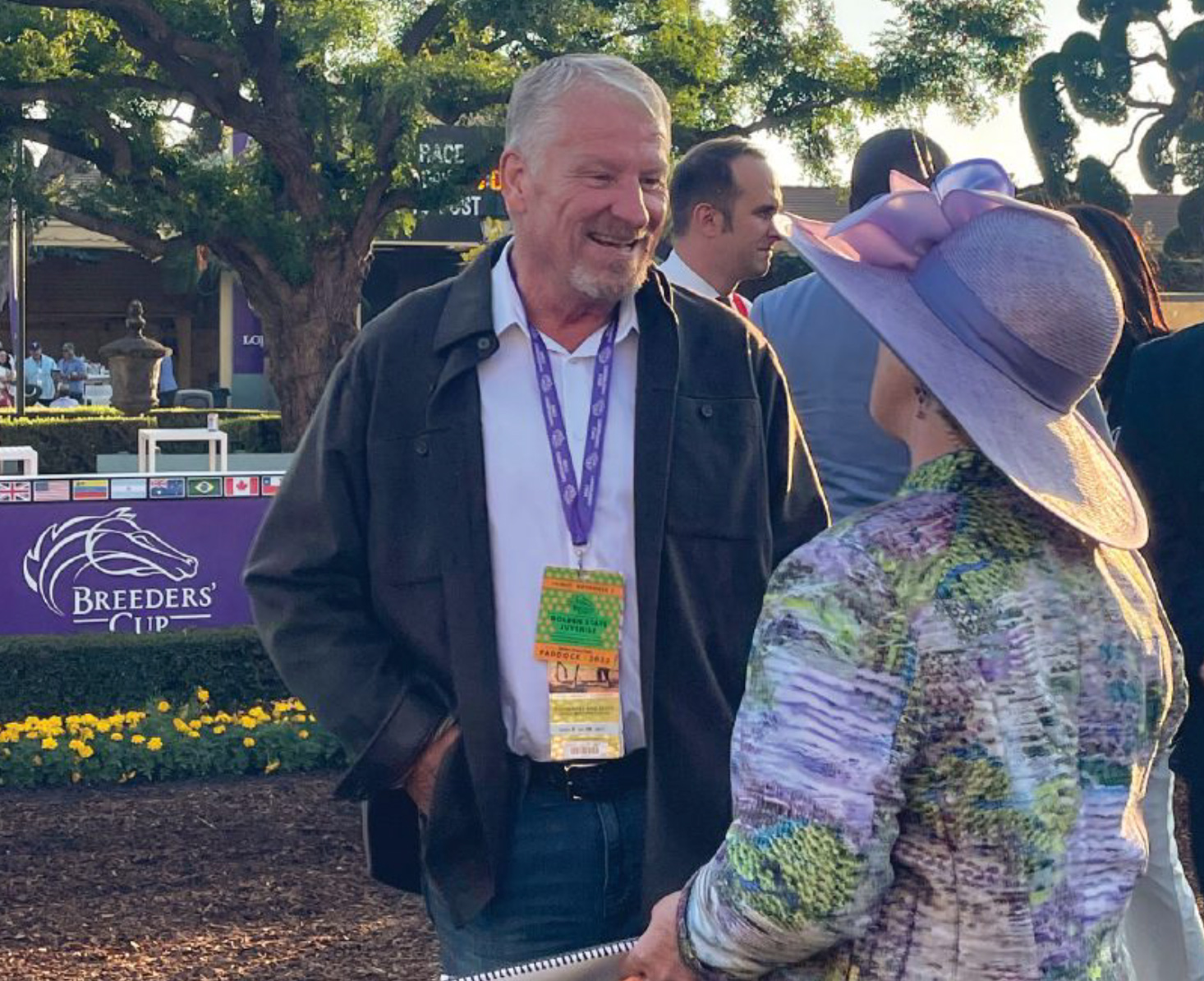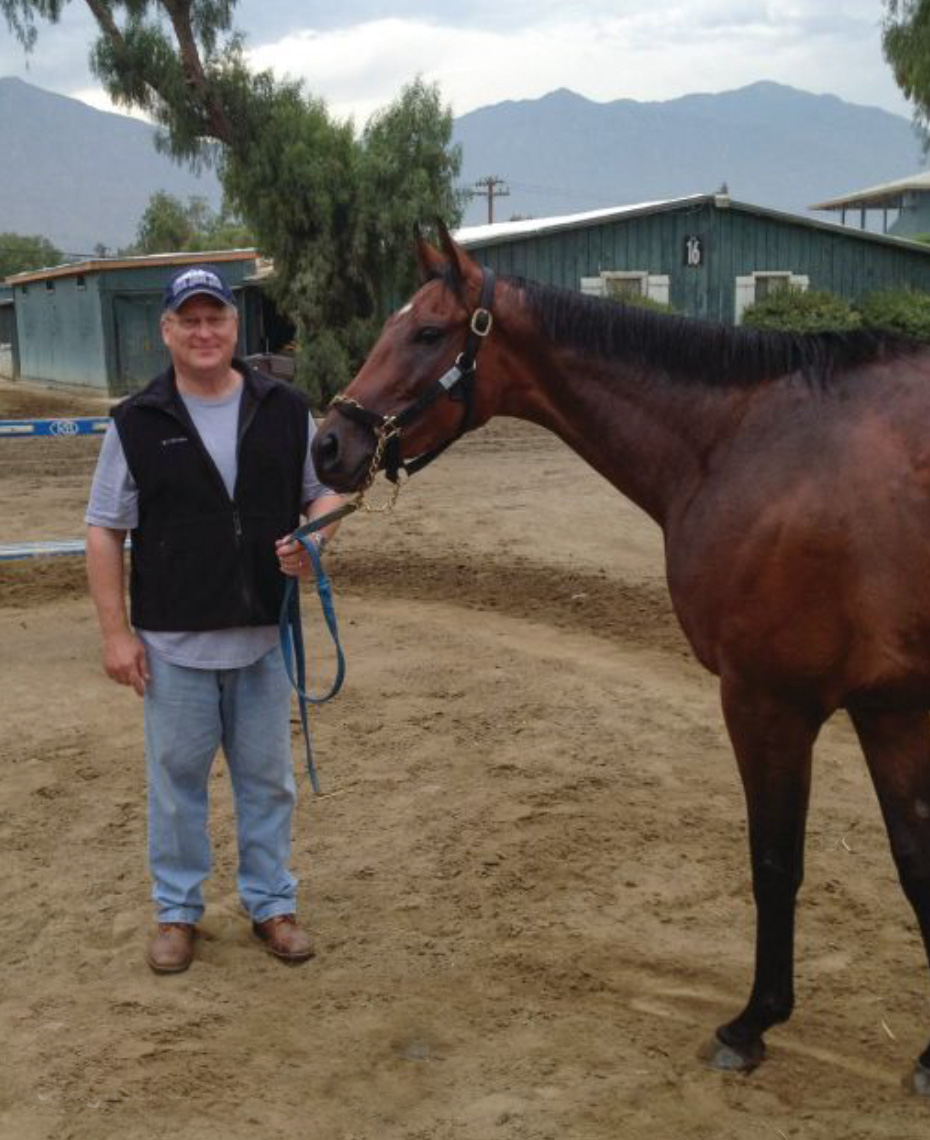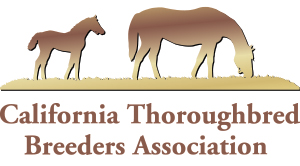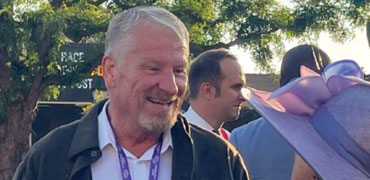Thomas Halasz, one of the owners of Bus Buzz, has a message for the aggressive animal rights organization PETA, which maintains that racing is indifferent to the welfare of its equine athletes: “This is how we care for our horses.” Halasz was referring to the lengths he and his partners went to in order to save Bus Buzz after the injury incurred by the stakes-winning California-bred.
In the final race of the first day of the Breeders’ Cup World Championships Nov. 3 at Santa Anita Park, Bus Buzz was in distress when pulled up in upper stretch while battling for the lead. The mishap, over in an instant, stunned the large crowd, which let out a collective gasp. PETA, in a statement released Nov. 7, questioned whether track and Breeders’ Cup officials, as well as trainer Steve Knapp, were covering up the condition of the 3-year-old Bus Buzz to avoid scrutiny. The group has long been opposed to the horse racing industry and closely monitors negative publicity about the sport.

Thomas Halasz, in the Santa Anita paddock, has more than 25 California-breds in training with Steve Knapp
Halasz can be outspoken, he admits, but said he’s had enough of PETA’s attacks. Actually, he notes that
fast action by jockey Edwin Maldonado to dismount — and a team of five veterinarians that quickly arrived on the scene along with a horse ambulance — helped save the injured gelding. Bus Buzz was fitted with a temporary splint and helped into the ambulance.
Surgery to fuse both fractured sesamoids in Bus Buzz’s front left leg was performed two days later, and Bus Buzz is recovering at Terry Lovingier’s Lovacres Ranch. Lovingier bred the California-bred son of Stay Thirsty and is a co-owner along with Amanda Navarro.
“Sorry if I wasn’t on Twitter letting everyone know every step of the way,” Halasz said in response to PETA’s criticism “The one thing I’ll always remember is Terry telling the doctors to keep this horse alive. ‘Do anything you need to do to keep this horse alive.’ PETA always likes to make it seem as though horse owners don’t care what happens to the horses. That’s wrong.” Bus Buzz was standing on all four legs a day after surgery, Halasz says, and now has a small walking pen to move about as he recovers. The owner thinks he’ll one day soon be fit enough to gallop, and when he does, “I can’t wait to send those photos to PETA.”
Halasz added, “We are going to let PETA know: This is how we take care of our horses. That’s a big problem in racing. Nobody stands up for this business today.”
Halasz says that by ability, the speedy Bus Buzz was the best horse he’s had during his 12 years as an owner. He lists the Cal-bred’s 4 1/2-length win in the $175,000 Real Good Deal Stakes at Del Mar Aug. 4 as his biggest thrill. Bus Buzz won three times in seven races prior to the injury with three seconds, banking $239,530.
Lovingier intends to retrain Bus Buzz to be his stable pony, according to Halasz.
“Even though he’ll never race again, he’ll live a very happy life at Lovacres,” Halasz said.

Halasz has bred such runners as Sheza Girly Girl, a Cal-bred daughter of Richard’s Kid
Halasz, 61, lives in Laguna Hills with his wife, Nancy. They have two adult daughters, Kelly and Sarah. Halasz’s company, Urban Roads, manufactures home furnishings in Mexico and Vietnam for some of the largest retail chains in the west.
He is the son of Hungarian immigrants who were among more than 10,000 refugees in the airlift named Operation Safe Haven that was ordered in 1956-57 by then – President Dwight D. Eisenhower in response to the Soviet Union’s crack-down on the Hungarian revolt against communism. His parents did not know each other at the time, but later met, married, and eventually settled in the Los Angeles area, Halasz says.
His father loved the races, and Halasz began attending at a young age.
“My mom and dad didn’t speak any English. But once they moved here, my dad found Santa Anita and Hollywood Park. I think part of the reason he loved racing so much was that it was something he could understand without speaking the language.”
Halasz has been involved in racing partnerships for several years, enjoying his greatest success with a group that owned Cal-bred Harlington’s Rose. A $20,000 yearling at Barretts in 2012, Harlington’s Rose, by Harlington and trained by Knapp, earned $420,058 over a 34-race career that included a victory in the 2015 Las Flores Stakes (G3).
Knapp has been training for Halasz since 2011.
“I have over 25 Cal-breds with Steve,” Halasz said. “We are looking for a big year together (in 2024).”
A couple of years ago, Halasz connected with Lovingier and has been part of the Lovacres group since. He’s also prominent at California sales. At the Fasig-Tipton California yearling sale Sept. 26 at Pomona, he purchased 11 horses for a total of $524,000. Eight of the yearlings were by Stay Thirsty, Lovacres’ leading stallion.
“You can get as good a horse in California as you can in Kentucky,” Halasz said. “You spend $20,000 in California, you may get something very good. You spend $20,000 in Kentucky, probably not.”
He’s willing to spend at the auctions, going to $97,000 at the Fasig-Tipton sale for a Cal-bred son of Practical Joke out of the Uncle Mo mare Cayman-bird in the Barton Thoroughbreds consignment. But he likes to bargain shop as well.
His 2-year-old Cal-bred Mici’s Express was a $5,000 buy in 2022 from the Fasig-Tipton sale and has earned $126,530. His perspective, Halasz says, “is totally gut. If there’s a horse that’s not getting action and I like something about the horse, I’m willing” to make a bid.
“Mici’s Express has run nine times, four times in stakes races,” he adds. “He was big-boned and you could tell he has a good mind. I bid $5,000 on him and nobody said a word.”
Halasz has bred a few horses, the best being Sheza Girly Girl, with Richard Brown. The Cal-bred daughter of Richard’s Kid has banked $351,832 with nine wins in 40 starts over a five-year career. She was claimed away from them in September 2022.
An enthusiastic supporter of California’s incentive program, Halasz mainly races state-breds.
“I look at it this way — the Cal-bred ranks make it worthwhile to race in California,” he explained. “I want to be in the winner’s circle as much as I can be, because there’s no better feeling than that.”


